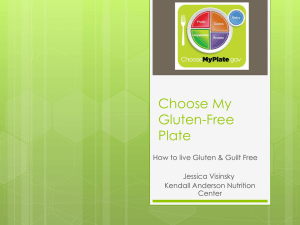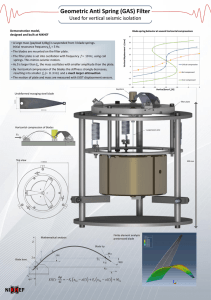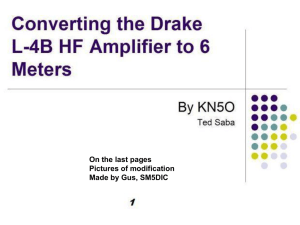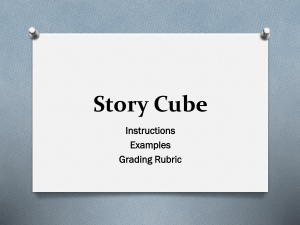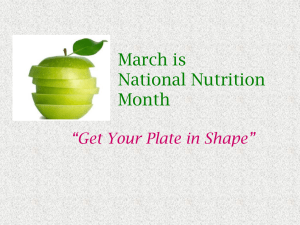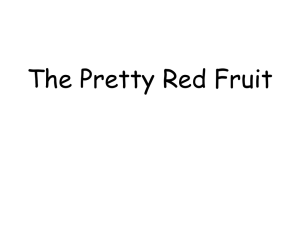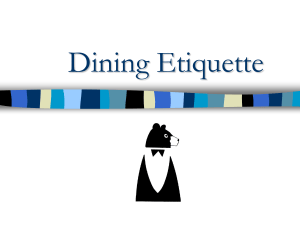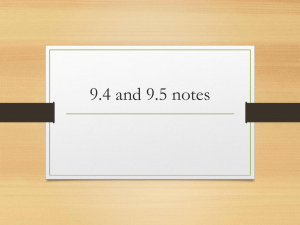Powerpoint
advertisement
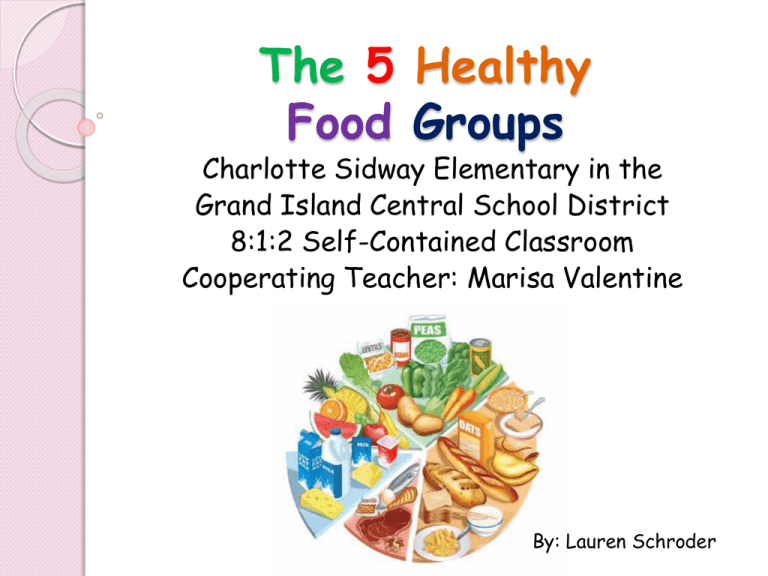
The 5 Healthy Food Groups Charlotte Sidway Elementary in the Grand Island Central School District 8:1:2 Self-Contained Classroom Cooperating Teacher: Marisa Valentine By: Lauren Schroder Class Background Kindergarten and first grade selfcontained classroom 8:1:2 Classroom Severe developmental delays Autism, Intellectual Disabilities, Multiple Disabilities Extensive Individualized Instruction Objectives Identify a picture of a food that belongs in a given food group. With support, place illustrations of healthy foods onto the food plate graphic organizer in the appropriate food group. Identify foods from each healthy food group and place the foods on the correct section of the My Healthy Plate. Essential Question Are you what you eat? Guiding Questions What is an example of a vegetable? What does a vegetable give your body? What is an example of a grain? What does a grain give your body? Enduring Understandings There are five healthy food groups and food from each group is important to consume on a daily basis. There are essential vitamins and minerals to help our bodies grow strong and stay healthy. NYS Standards Level: Elementary Learning Standard: MST Standard: Science Content Standard: Content (4) Area of Study: Living Environment Key Idea: (5) Organisms maintain a dynamic equilibrium that sustains life. Performance Indicator and Major Understanding Performance Indicator: (5.3) Describe the factors that help promote good health and growth in humans. Major Understanding: (5.3a) Humans need a variety of healthy foods, exercise, and rest in order to grow and maintain good health. Pre-Assessment Circle the food that is a grain. (pasta, bread, cereal) Circle the food that belongs to the dairy food group. (milk, cheese, yogurt) Formative Assessment Summative Assessment Students created a My Healthy Plate by placing one food from each healthy food group on the appropriate color section of the plate. Rubric Attributes for My Healthy Plate 4 Level of Learner Assistance received (Weight: 5) no more than two verbal prompts to complete the food plate. 3 Learner received more than two verbal prompts to complete the food plate. 2 Learner received more than two verbal prompts and some touch prompting to complete the food plate. 1 Learner received hand over hand assistance to complete the food plate. Rubric Attributes for My Healthy Plate Accuracy of food chosen for the fruit section of the plate. (Weight: 1) 4 A fruit is glued on the red section of the plate, conveying the learner’s understanding of the fruit food group. 3 A fruit is glued on the red section of the plate; however, learner needed assistance identifying the food as a fruit. • Neatness and Completeness 2 A food in the fruit group is glued on the incorrect section of the plate. 1 There is no fruit glued on the plate. Distinguished Student Work Rubric Score Level of Assistance: 4 Accuracy of food: ◦ ◦ ◦ ◦ ◦ Fruit Vegetable Grain Dairy Meat 4 4 4 4 4 Neatness and Completeness: Score: 98.8% 3 Distinguished Student Work Rubric Score Level of Assistance: 3 Accuracy of food: ◦ ◦ ◦ ◦ ◦ Fruit Vegetable Grain Dairy Meat 4 4 4 4 4 Neatness and Completeness: Score: 87% 3 Proficient Student Work Rubric Score Level of Assistance: 2 Accuracy of food: ◦ ◦ ◦ ◦ ◦ Fruit Vegetable Grain Dairy Meat 4 4 4 4 4 Neatness and Completeness: Score: 75% 3 Student Data Pre-Assessment: Food Identification Level Number of Students % of Students Distinguished Proficient 1 2 20% 40% Developing 2 40% Post Assessment: My Healthy Plate Level Distinguished Proficient Developing Number of Students 4 1 0 % of Students 80% 20% 0% Student Data Modification Table Modification Type Instructional Modification Rationale Dinosaur puppet used during anticipatory set and guided practice The dinosaur attracted the student’s interest early on in the lesson and kept them engaged. Programmed food illustrations into communication device and different methods of questioning In order for students to be engaged as much as possible each student participates differently based on their speech/language skills. Material Life-size pretend food in bird seed The life size food provides students with concrete examples of food from each food group. The students enjoy sensory activities. Task Large illustrations of each food group inside the individual baggies Verbalizing complex vocabulary is very difficult for all of the students. Reflection Student data supports my claim that students achieved the learning objectives of the lesson. Important unit for teaching students about eating healthy and tasting new foods. Things I will change: ◦ Community based instruction ◦ S.M.A.R.T. Board matching activity ◦ Picture Dictionary Thank you all! A sincere thank you to all of my peer reviewers Christen Lawicki, Chelsea Ventura, Krista Engels, Michelle Mullar, Christina Giambrone, Allie Gudonis, and Melanie. Thank you for all of your feedback to help my strengthen my Learning Experience!
